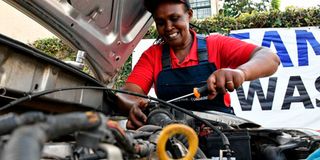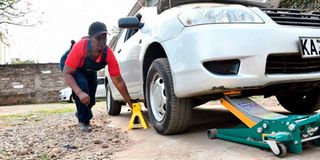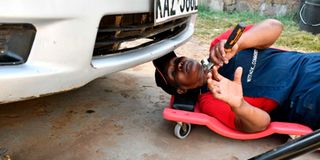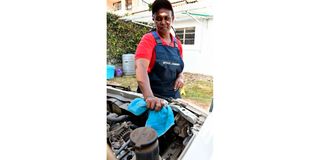Premium
I dared to follow my dream and it paid off...

Rodah Ireri defied deep-seated norms and dared to follow her dream of becoming a mechanic at a time when society frowned on women who dared to pursue careers viewed as a preserve of men.
It was obvious to everyone, her parents, siblings, extended family and neighbours, that Rodah Ireri, now in her 50s, was no ordinary girl. Growing up in Mbeere, Embu County, rather than play with dolls, play house or help her mother cook and clean like other girls in the neighbourhood, Rodah would skid, climb trees and herd goats with the boys.
“Actually, it is me who used to tend to our goats,” she quips.
She even preferred trousers and shorts to dresses and skirts favoured by fellow girls.
Initially, her parents were not bothered by how ‘different’ she was from other girls, they believed this phase would fizzle out and she would grow to become a ‘proper’ young woman.
Not only was she a tomboy, her curiosity and boldness was unmatched. It could be these traits that would dare her to challenge societal norms and values in a then extremely patriarchal society.
She vividly recalls the first time her interest in mechanical engineering was sparked – she was in primary school then and an uncle, who owned a motorcycle, visited them. She was in awe of the machine.
“I remember wondering where the roaring noise was coming, in fact, determined to find an answer, I burnt a hand when I inserted it into the motorbike’s exhaust pipe before it had cooled down,” she says.
She was hooked, and knew what she wanted to do with her life.
Contrary to now, then, a woman venturing into the field of mechanical engineering, considered a male preserve, was unheard of, a taboo even. From alienation, being shunned by her family and taunted, referred to as a social misfit, Rodah, a seasoned mechanic, has been through it all in a quest to follow her passion, a career that was deemed to be only for boys.
“My parents did not mind at first, (her lack of interest in activities associated to girls). Since women did not have much say then, my mother would just say, ‘I am praying for you’, when relatives commented that I should have been born a boy,” she recalls.
Only her elder sister, who was a nurse at a hospital in Nakuru County, understood and supported her. Not only did she pay for Rodah’s secondary school and college fees, she also stood by her and cheered her on, encouraging her to pursue her dreams.
Joining Nakuru High School in 1981 was just what the doctor ordered since the school offered a variety of technical courses, ranging from electrical work, woodwork, and welding, among others.
“Ours was the second class in the institution to study technical courses - I was introduced to woodwork, electrical, mechanical and automotive engineering her. In my O' levels, I chose automotive engineering as one of the subjects I would sit for in my national examinations,” she says.
Convincing her no nonsense father, who had all along wanted her to study medicine that she wanted to become a mechanic, was impossible, a factor that triggered a long-running rift between father and daughter.
Adamant that Rodah had to be a doctor, her father went on and enrolled her at Nakuru’s Kenya Medical Technical College after she completed her O Levels.
“I was totally disinterested in medicine, and during the first month of joining, I never attended a single class. My elder sister, who was paying my school fees, knew this, but never told my parents, she knew how distressed I was since this wasn’t the career I wanted.”
One day, a fellow student who knew about her interest in engineering saw an advert by DT Dobie’s training institute inviting those interested in becoming mechanics to apply to their college.
“This colleague, as well as my elder sister Judy Ireri, encouraged me to apply since I met all the requirements. I sent my application, even though I was skeptical about being selected. To my surprise, I was invited for an interview,” she says.
On the material day, she woke up bright and early, and headed to the interview venue armed with her invitation letter. Only to be prevented from getting in by the guard at the gate.
“He was reluctant to let me in when I told him the purpose of the visit. He laughed, then bluntly told me that he had never heard of a woman mechanic and that there would never be one.”
She adds, “He prevented me for getting in for some time until he was ordered to let me in - the interview had been delayed for about 10 minutes to await my arrival. I was the only woman that attended that interview.”

Rodah looks forward to when the playing field in this sector will level out.
A week later, she was informed that she had been selected to join the training centre, becoming the first woman mechanic trainee in the college.
“When we were reporting, I remember a fellow trainee commenting that he was happy that I had been picked because he would never be the last one in class. I decided to prove him wrong,” she says.
But dealing with such stereotypes was nothing compared to the arduous task of breaking the news to her father – that she had dropped out of medical college and was now training to become a mechanic.
“I could not even face my father. I told my mother and she started crying because she knew the horror that awaited her. It was a very difficult time. My dad was furious - ‘After all the money which has been used to educate you, you have decide to be a mechanic?’ he wondered.
Rodah’s relationship with her father was strained throughout the entire time she was in college. She would go home for the holidays but would not see nor speak to him until school reopened. The only saving grace was the fact that she did not have to worry about fees or upkeep money, since being the only woman mechanic, the college offered her a scholarship. She put all her focus in the training and graduated in 1990 having performed well.
But her good performance did not mellow her relationship with her father, in fact, it was so strained, that no family member attended her graduation, the only person that did was her boyfriend, who would go on to became her husband. She and her husband, Joseph Munyi Ita, an automotive engineer, have been married for 30 years now, and have five grown up children.
A year after graduation, she got her first job with DT Dobie, where she worked for 17 years. Her father would only come around when her success was evident and she bought her first car.
“I sent an uncle to inform my parents that I would visit. I had bought a small Jeep then, and my father was waiting for me at the shopping center. You should have seen his face when he saw me driving a car since it was rare those days for a woman to drive, let alone own a car. He was besides himself with happiness. He even called all his friends to see my car, including those who used to taunt him about me,” says Rodah .
Her husband, she says, has always supported her in her career, and is so proud of her achievements, that when he introduces her, he points out that she is a mechanic.
“Initially, I would feel uneasy, but I grew to like it because it meant that he was proud of me,” she says, adding that her children too are proud of her, in fact, their last born, Paul Mwago, who is 22, is set to join a technical institution to study Automotive Engineering.
Being pregnant was perhaps the greatest challenge she has faced in her career, a factor that aggravate her woes in the already hostile gender biased field at the time.

Her husband is an automotive engineer, while her last born, who is 22, wants to study the same course.
“During my first pregnancy, some of my workmates, all men, mocked me, pointing out how unfit a job this was for a woman,” she recounts.
The jabs were so bad, that at some point she contemplated quitting. But she decided to keep going, after all, she had made it this far. It also helped that her employer was supportive of her and accommodating, moving her from one work station to another as her pregnancy advanced until she went for maternity leave.
Later on in 2008, she left DT Dobie and joined Simba Cooperation where she worked until 2019 when she resigned to start her own business.
Her experience has taught her that every woman in a demanding professional field requires to put in extra effort to compete with her male counterparts, bearing in mind that she is a wife and mother too.
Drawing from her experience, she emphasises the need for parents to allow their children freedom to chart their own path.
“I have been careful to allow my children to pursue the careers they want. A parent cannot choose a career for their child, if you force them to do what they are not interested in, they will not use it in the future, allow them to follow their passion,” she argues.
Rodah’s garage is located along Ngong Road, Nairobi. She has employed three young women, one on permanent basis, two as casuals. When we visit her place of work, we find her lying underneath a car, busy fixing it – clearly, she’s a hands on employer, and yes, she is right where she belongs.
“Yes this is exactly what I wanted. To handle vehicles. My dream was to become a car doctor, and it came to pass,” she comments with a big smile, going on to explain the kinds of services they do.
“We do all car repairs and service maintenance,” she offers.
The business relies on social media platforms such as Facebook as well as word of mouth through referrals to reach potential customers. Like any start-up, Rodah’s venture has its own fair share of challenges, the first being that her garage is open air. She looks forward to a well-equipped space that is secure and conducive for the women workers she has employed, one that will also grow to train and employ more women and girls.
Gender stereotyping is still the biggest challenge she faces in her career. Despite her vast experience and having been trained by the very best, most vehicle owners are still doubtful that a female mechanic can be as good in her work as a male one. But she refuses to allow this mind set to dim her resolve.
“I remember once, when travelling back home with my husband, we came across a middle aged man stranded on the road with his Mercedes. I noticed he had a DT Dobie sticker therefore he was our client. My husband asked me to help him. I alighted from the car and inquired what the problem was, instead, he ignored me and looked at my husband – my husband told him, ‘she is the only one who can help you’.”
The man reluctantly allowed her to take a look, but would keep instructing her not to touch this and that. Rodah kept her cool and when she was done, she asked him to start the car. It did.
“He was so embarrassed, that he invited us for dinner at a luxurious hotel in Embu and gave me Sh20,000, which was a lot of money those days - we became friends,” she recounts with good humour.
She points out that it is not only male clients that are skeptical of the capability of female mechanics, women too are skeptical, and usually allow them to just service and wash the vehicles even though they are experts in all car works.
Rodah is the founder of Women In Technical Field Association Of Kenya, WITFAOK, which she started in 2015 while still working with Simba Corp. Her aim is to mentor young girls, young mothers and women in general to undertake technical courses as well as provide apprenticeship and employment for female mechanics through WITFAOK. She looks forward to the day that there will be a level playing ground in the sector, one that is blind to gender orientation.

Rodah resigned in 2019 to start her own garage.
“There is still gender stigmatisation in this field. The society still claims that this is a man’s job, WITFOAK endeavours to fight this stigmatisation until our girls know that yes, it is possible for a woman to thrive in the technical fields – one of the ways we do this is by sharing with them our life’s journey and our achievements.”
Recently, on April 23, the she organised a free event, Ladies Car Care Campaign, whose aim was to teach women motorists about their cars and how to maintain them. She is upbeat that her spirited campaigns intended to encourage more women to join the technical sector, will play a major role in alleviating poverty, gender stereotyping as well as create job opportunities.
Talking to women in technical fields such as hers, Rodah shares her wisdom drawing from her experience, the first being the need to place a firm boundary between family affairs and professional matters, adding that it is also important to have a spouse that fully supports your career.
She also points out that it is important not put all your eggs in one basket, for instance, she has also invested in poultry farming to supplement income from her garage.
“I do small scale farming. I keep improved kienyeji chicken for eggs and meat, which I sell.”
She also urges women and youth to equip themselves with skills that can enable them to become self-employed and at the same time create employment opportunities for others.
“Don’t wait to get employed, use your skills to employ yourself and create jobs for others,” she advises.





